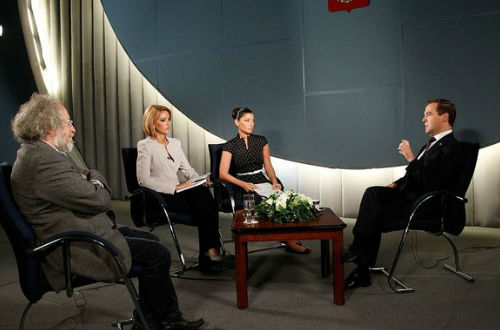
Medvedev Reflects On the Georgia War and On Himself
Publication: Eurasia Daily Monitor Volume: 8 Issue: 152
By:

President Dmitry Medvedev’s interview on August 5 about the causes and consequences of the August 2008 war with Georgia contained little news and more than a few lies, but it still sheds some interesting light on the current political disarray in Russia. Shunning the official media, Medvedev opted for answering sharp questions from the fiercely independent Ekho Moskvy, the Russian-language Georgian TV channel PIK (famous for its criticism of Russia’s policy in the Caucasus) and the Russia Today TV channel, which seeks to attract Western audiences. The journalists had no instructions other than to stay with the theme, and Medvedev actually made a better impression than in most carefully orchestrated media events (Ekho Moskvy, Kommersant, August 5). The sincere engagement with the difficult conversation shows that he perceives that short military clash as the most significant moment of his rather unsuccessful presidency and wants his name to be linked with the victory, dubious as it is.
What struck many Russian commentators was the rudeness of Medvedev’s remarks about Georgian President Mikheil Saakashvili, whose name came up many times in the interview as the person solely responsible for the eruption of the war and standing in the way of the normalization of bilateral relations (Moskovsky Komsomolets, www.snob.ru, August 6). There is obviously more to that intense animosity than just irritation about the rather accurate characteristic as a person who cannot take any decision but likes to tell every counterpart exactly the right thing (Ekho Moskvy, July 8). What angers Medvedev deeply is that Saakashvili is able to deny him the opportunity to turn this page in relations with the US and the EU, making sure that the issue of Russia’s responsibility for the destruction of Georgia’s territorial integrity remains open in every international forum.
The deadlock in the negotiations on Russia’s accession to the World Trade Organization (WTO) is one of the constant irritants, and Medvedev tried to convince Georgia of the benefits of compromising on principles for the sake of economic rewards. The attempt was half-hearted at best because he knows full well that Russia’s economic policy is turning toward protectionism, which goes against the WTO philosophy (www.gazeta.ru, August 5). The recent US Senate resolution on the Russian “occupation” of Abkhazia and South Ossetia signified another victory for Saakashvili in the war of discourses (www.gazeta.ru, August 1). Medvedev dismissed it in a rather undiplomatic manner, and his words about the “preferences of certain senior citizens in the Senate who, due to non-objective reasons, have aligned themselves with certain individuals” were inexcusably uncivil.
Bashing Saakashvili and pointing fingers at the former US Secretary of State Condoleezza Rice may please Russian audiences, but belittling Russian Prime Minister Vladimir Putin is a risky game, and Medvedev did it twice in the uncensored interview. Firstly, he insisted that the first conversation between the two co-rulers took place 24 hours after he had issued the order to the generals to open fire. Knowing Medvedev’s and Defense Minister Anatoliy Serdyukov’s total incompetence in military matters and Putin’s obsession with control, it is hard to believe that he remained out of the war picture in the critical day (Ekho Moskvy, August 5). Secondly, Medvedev firmly rejected Putin’s proposition that South Ossetia might be incorporated into the Russian Federation asserting that “there are no legal or de facto prerequisites for that to happen.” Showing this audacity, Medvedev is in tune with the shift in public opinion where support for this territorial acquisition has dropped to 23 percent from 35 percent two years ago (www.levada.ru, August 5).
Putin’s interest in South Ossetia is limited to receiving some value for the wasted money, but his real concern is about changing the dynamics of destabilization in the North Caucasus where the interplay of violent conflicts feeds a smoldering civil war (Nezavisimaya Gazeta, August 3). Visiting Stavropol last week he emphasized that control over the North Caucasus “allows Russia to assert our geopolitical interests in this region of the world” and informed the select group of young Putinists that Moscow has faced the problem of stabilizing this troubled area since the early nineteenth century (Kommersant, August 4). He has ordered the government to put together a regional development program for the next 12 years, but the demands for budget allocations from the local rulers clash with the sober realism adopted by the finance ministry (Vedomosti, August 3). The strategy of extinguishing conflicts in the North Caucasus by flooding it with money is indeed utterly unrealistic not least because up to one third of this financial stream now flows directly into funding for criminal gangs and extremist networks (Novaya Gazeta, August 2). The idea of paying a heavy tribute to Chechnya and Dagestan and gaining nothing but trouble in return is becoming very unpopular with Russian voters, and Putin cannot dissuade them by using geopolitical arguments (Moskovskiy Novosti, August 1).
Neither Medvedev’s bragging over the victory in the entirely unnecessary war, nor Putin’s imagining of how the growth of tourism would change the parochial mentalities, could hide the absence of direction in Russian policy in the Caucasus. Medvedev argues that Armenia and Azerbaijan have learned a lesson from Georgia’s debacle, but his proactive mediation in the Karabakh conflict has been unhelpful, and there is slim chance that his meeting with President Ilham Aliyev this week would dissuade the oil-intoxicated sultan from preparing for a new war (www.polit.ru, July 28). Putin believes that Ramzan Kadyrov will hunt down the Chechen rebels, but this model is irreproducible in other North Caucasian republics and unaffordable for the strained federal budget, while also empowering an ambitious and maverick warlord (www.grani.ru, June 14).
Moscow’s strategy in the Caucasus has arrived at a dead-end shaped by too many self-made traps, from the recognition of Abkhazia and South Ossetia as independent states to the preparations for the 2014 Winter Olympic Games in Sochi. The best hope for the increasingly dysfunctional Putin-Medvedev duumvirate is to stay put in this blind-alley checking the escalation of challenges and buying time by disbursing money. Perhaps already by next August, a new Russian president might have to spell out a much more sober assessment of the inglorious war.




